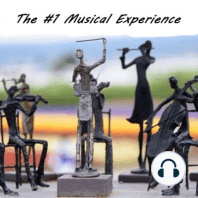16 min listen
Classical Music For Studying (Vol) # 2
ratings:
Length:
73 minutes
Released:
Jul 12, 2021
Format:
Podcast episode
Description
6 Great Reasons to Study MusicSubmitted by: https://mountainheightsacademy.org/Many students and their parents think that you should only study music if you seem to have an innate gift for it, but the truth is, anyone and everyone can study music. In fact, studying music, regardless of your musical skill level, has a number of mental and psychological benefits to offer. Here are six reasons why everyone should study music.IT SHARPENS YOUR MEMORY.Many young students gain their first experiences with memorization by practicing and performing musical pieces. Students hone their memorization skills and strengthen their muscle memory through musical practice.IT OFFERS A CREATIVE OUTLET.Those who study singing or playing an instrument often use their practice as a wholesome creative outlet for their emotions. The impact that music can have on our emotions is remarkable and might even play a role in relieving stress and anxiety.IT TEACHES DISCIPLINE.If you want to instill a strong sense of discipline in your child, providing your child a musical instrument is a great place to start. Learning to play a musical instrument is one of the most tangible ways you can learn the importance of discipline, as your musical skills will only progress if you are willing to practice.IT STRENGTHENS THE MIND OVERALL.If you’re looking to improve your overall performance in school, music study can help you get there. Studies have shown that those who study music perform better in a variety of subjects, including math, science, reading, and language. Students in music appreciation courses also tend to perform better on the SAT, earning an average of 63 points higher on the verbal section and 44 points higher on the math section.IT FOSTERS TEAMWORK.Often students are taught music in a group environment, such as a choir, band, or orchestra, where they must work together to perform larger, more complex pieces of music. This is a great way for students to learn how to contribute their own talents while depending on other students to create something great.IT IS AVAILABLE TO NOVICES OR EXPERTS.The study of music is much more than learning how to sing or play an instrument. In our middle school Music Connections course, for example, students explore how music affects culture, develop analytical and evaluative skills in music listening, and investigate the various purposes of music. In our high school Music Theory course students learn how to read music and hone their listening skills by learning how to recognize intervals and tonality. Beginners and advanced students can find a music course to fit their needs.As you can see, studying music can have a significant impact on students and their ability to memorize, to increase creativity, to improve discipline, mental capacity, and their opportunity for collaboration. Music classes are available for students of all talent levels, too. Get bonus content on Patreon Hosted on Acast. See acast.com/privacy for more information.
Released:
Jul 12, 2021
Format:
Podcast episode
Titles in the series (100)
Beethoven Symphony no. 5 in Cm, Op. 67 - III. Allegro attacca: Why We Should Expose Our Kids To Classical Music https://ourtownlive.net #herbw79The Symphony No. 5 in C minor of Ludwig van Beethoven, Op. 67, was written between 1804 and 1808. It is one of the best-known compositions in classical music and one... by The #1 Musical Experience
